Related Research Articles

Sukarno or Soekarno was an Indonesian statesman, orator, revolutionary, and nationalist who was the first president of Indonesia, serving from 1945 to 1967.

Semaun, also spelled Semaoen, was the first chairman of the Communist Party of Indonesia (PKI) and was a leader of the Semarang branch of the Sarekat Islam.
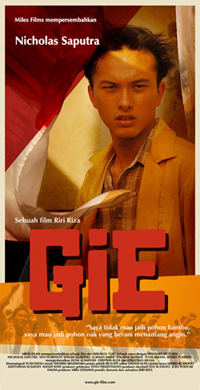
Gie is a 2005 Indonesian biopic film directed by Riri Riza. The film tells the story of Soe Hok Gie, a graduate from University of Indonesia who is known as an activist and nature lover. The film is based on a diary Catatan Seorang Demonstran written by Soe himself. The plot of this film is an interpretation of the filmmakers, and scenes portraying Soe's private life may be partly fictionalised for dramatisation.
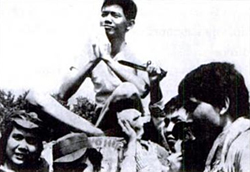
Soe Hok Gie was a Chinese Indonesian activist who opposed the successive dictatorships of Presidents Sukarno and Suharto.
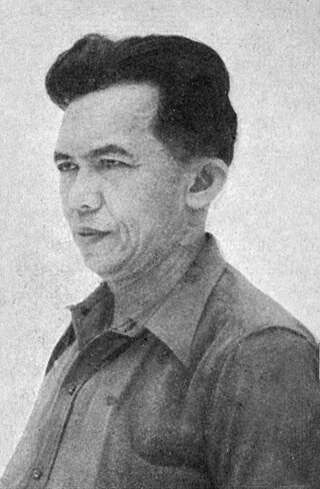
Tan Malaka was an Indonesian teacher, Marxist, philosopher, founder of Struggle Union and Murba Party, independent guerrilla, Indonesian fighter, and national hero. Tempo credited him as "Father of the Republic of Indonesia".
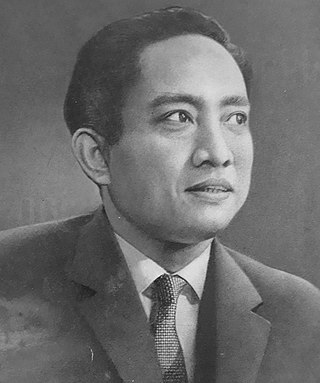
Dipa Nusantara Aidit was an Indonesian communist politician, who served as General Secretary of the Communist Party of Indonesia (PKI) from 1951 until his summary execution during the mass killings of 1965–66. Born on Belitung Island, he was nicknamed "Amat". Aidit was educated in the Dutch colonial system.
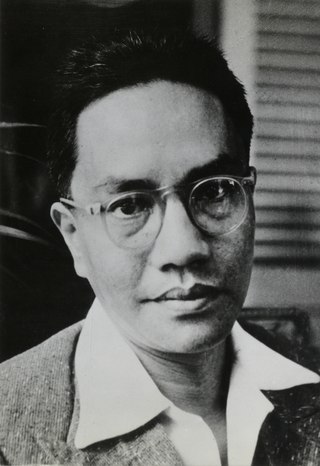
Amir Sjarifuddin Harahap was an Indonesian politician and journalist who served as the second prime minister of Indonesia from 1947 until 1948. A major leader of the left-wing during the Indonesian National Revolution, he previously served as Minister of Information from 1945 until 1946 and Minister of Defense from 1945 until 1948. Amir was born into the Sumatran aristocracy, and was educated at Leiden University. At Leiden, he became a member of the board of the Gymnasium student association in Haarlem, and was involved in the Batak student organization Jong Batak. He returned to Indonesia due to family troubles, but continued his education at the Rechts Hogeschool in Batavia.

Munawar Musso was a leader of the Communist Party of Indonesia and one of the key figures in the 1948 Madiun affair.

Sarekat Islam or Syarikat Islam was an Indonesian socio-political organization founded at the beginning of the 20th Century during the Dutch colonial era. Initially, SI served as a cooperative of Muslim Javanese batik traders to compete with the Chinese-Indonesian big traders. From there, SI rapidly evolved into a nationalist political organization that demanded self-governance against the Dutch colonial regime and gained wide popular support. SI was especially active during the 1910s and the early 1920s. By 1916, it claimed 80 branches with a total membership of around 350,000.
Kamaruzaman Sjam, also known as Kamarusaman bin Achmad Mubaidah and Sjam, was a key member of the Communist Party of Indonesia who was executed for his part in the 1965 coup attempt known as the 30 September Movement.
Lukman Njoto or Njoto was a senior national leader of the Communist Party of Indonesia (PKI), who joined the party shortly after the country's declaration of independence, and was killed following the 1965 coup attempt.

The Madiun Affair, known locally as the Communist Party of Indonesia rebellion of 1948, was an armed conflict between the government of the self-proclaimed Republic of Indonesia and the left-wing opposition group Front Demokrasi Rakyat during the Indonesian National Revolution. The conflict began on September 18, 1948, in Madiun, East Java, and ended three months later when most FDR leaders and members were detained and executed by TNI forces.
The Socialist Party was socialist political party in Indonesia which existed from 1945 to 1948. The party was founded as a merger between the Socialist People's Party (Paras) of Prime Minister Sutan Sjahrir and Socialist Party of Indonesia (Parsi) of Defence Minister Amir Sjarifuddin. Sjahrir became chairman of the unified party, whilst Sjarifuddin became vice-chairman.
The All-Indonesian Federation of Workers'Organisations was the largest trade union federation in Indonesia. Founded during the period of the country's independence in the late 1940s, the federation grew rapidly in the 1950s. Initially formed with loose connections to the Communist Party of Indonesia (PKI) and with members from other parties, over time the PKI became dominant in the organisation. With the introduction of President Sukaro's guided democracy in the late 1950s, SOBSI was formally recognised and given a place in the national decision-making structures. In the 1960s, SOBSI came into conflict with the Army, whose officers controlled the country's state enterprises. Following the 1965 coup that subsequently produced Suharto's New Order regime, SOBSI was declared illegal, its members killed and imprisoned and most of the leadership executed.
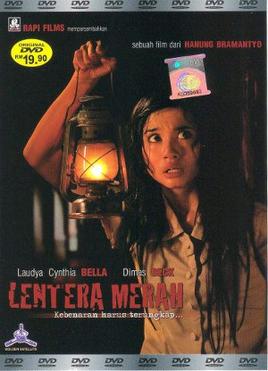
Lentera Merah is a 2006 Indonesian horror film directed by Hanung Bramantyo.

Wikana was an Indonesian minister and independence leader. He was one of the youths who forced Sukarno and Hatta to declare independence immediately after the surrender of the Japanese. He was the first Indonesian Minister of Youth and Sport. He was a member of the Indonesian Communist Party. Sometime after the 1965 coup d'état attempt, he was arrested and went missing.

Bintang Merah was a magazine of the Communist Party of Indonesia which published in Jakarta from 1945 to 1948 and again from 1950 to 1965. It described itself as a magazine of Marxist-Leninist politics and theory.
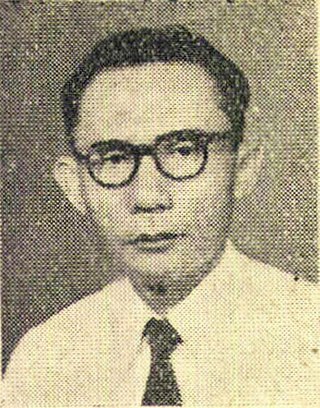
Osa Maliki Wangsadinata was an Indonesian politician who served as the chairman of the Indonesian National Party (PNI) and a deputy speaker of the People's Consultative Assembly (MPR) from 1966 until his death. Born in Padalarang, Osa was educated at a Taman Siswa school. He participated in an unsuccessful communist rebellion against the colonial government in 1926, being exiled to the Boven-Digoel concentration camp as a result. After returning from exile in 1938, he worked as a teacher. During the Japanese occupation, Osa worked in the propaganda section of a Hōkōkai and became a member of the Suishintai, however, he was briefly detained by the Kenpeitai over his connections to an underground resistance movement.
Tan Ling Djie was Indonesian communist politician active during the late 1940s and 1950s.
References
- 1 2 3 4 Soe, Hok Gie. Orang-Orang di Persimpangan Kiri Jalan . Bandung: MMU, 2005. pp. 110-112
- ↑ Klinken, Geert Arend van. Minorities, Modernity and the Emerging Nation: Christians in Indonesia, a Biographical Approach [ permanent dead link ]. Verhandelingen van het Koninklijk Instituut voor Taal-, Land- en Volkenkunde, 199. Leiden: KITLV Press, 2003. p. 192
- ↑ Soe, Hok Gie. Orang-Orang di Persimpangan Kiri Jalan . Bandung: MMU, 2005. pp. 110-188